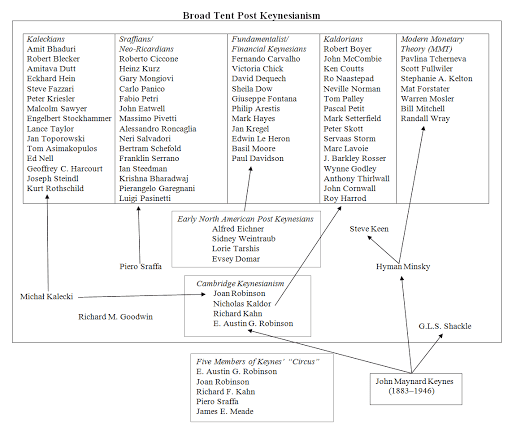Nicole L. Kormann da Silva (Guest Blogger)I am from Brazil and I did my bachelor’s degree at Universidade Federal de Santa Catarina. I would say the course there can be relatively multidisciplinary and open to alternative approaches, but macroeconomics was mainly restricted to conventional textbooks and it was only during other classes like Political Economics and Economic Development of Brazil that some insights came across my mind: it was possible – and in fact there was already a structured body of work on it – to perceive economics from another starting point.For me heterodox economics is a pluralist umbrella under which, among other schools, you find Post-Keynesian economics – PKE. I would say heterodox economics give us the possibility to rethink economics in a more realist term and
Topics:
Matias Vernengo considers the following as important:
This could be interesting, too:
Robert Vienneau writes Austrian Capital Theory And Triple-Switching In The Corn-Tractor Model
Mike Norman writes The Accursed Tariffs — NeilW
Mike Norman writes IRS has agreed to share migrants’ tax information with ICE
Mike Norman writes Trump’s “Liberation Day”: Another PR Gag, or Global Reorientation Turning Point? — Simplicius
I am from Brazil and I did my bachelor’s degree at Universidade Federal de Santa Catarina. I would say the course there can be relatively multidisciplinary and open to alternative approaches, but macroeconomics was mainly restricted to conventional textbooks and it was only during other classes like Political Economics and Economic Development of Brazil that some insights came across my mind: it was possible – and in fact there was already a structured body of work on it – to perceive economics from another starting point.
For me heterodox economics is a pluralist umbrella under which, among other schools, you find Post-Keynesian economics – PKE. I would say heterodox economics give us the possibility to rethink economics in a more realist term and grasp the intricacies that shape our society and the relations necessary for the reproduction of people and the system. PKE has its origins on the work of Keynes and Kalecki and understands that e follow a historical trajectory permeated by things that cannot be calculated, and are affected by fundamental uncertainty.
The main contributions of PKE in my opinion lay on its very fundamental aspects. They break with the economicism of the mainstream, that reduces economics to a technical matter, making clear that the macroeconomics is not the sum of decisions made by rational agents. PKE permit us to comprehend that there are different roles to private and public agents and we cannot treat them as equals, in particular when it comes to their ability to expand demand and eliminate unemployment. Besides, economics is permeated by class struggle and distributive conflict. This leads us also to a political dimension, like Kalecki make clear: full-employment might be constraint not for lack of theoretical knowledge, but by political interest. Lastly, preferences for liquidity enter the system and the principle of effective demand tells us that just by a great coincidence demand matches supply with full employment of resources. This has important implications for policy-making.
Celso Furtado – a Brazilian economist – once told in a graduation speech: “The greater the responsibility of men of thought the more intense is the process of transformation of the society in which they live”. He was talking with the economic students of 1959 of Universidade de Minas Gerais, but I believe it applies to all those who decide to follow the field. So that is more or less what brought me to study PKE. I was questioning myself “how can you really change something looking at it through a framework that does not represent it?” To build solid economic knowledge and from it derive policies and the path for development I would have to understand how the real world functions and acquire the tools to work within it.

